Table of contents
General considerations about rosemary oil

First of all, know that rosemary oil is not only used in gastronomy, but also to improve the quality of life, bringing a lot of well-being.
Essential oils bring relaxation when used in massages, however, the rosemary oil goes beyond this acting with preventive action for various diseases, relieving symptoms and effectively combating existing problems.
Rosmarinus oficcinalis, known as rosemary, is a plant native to Europe and the Mediterranean.
In ancient times, it was used to scare away evil spirits and in the time of pests and plagues, a sprig of rosemary was carried in the purse, clothing or neck for protection.
Learn in this article all about rosemary oil: what it is for, how to make, contraindications and more!
Rosemary oil, how to make, contraindications and side effects
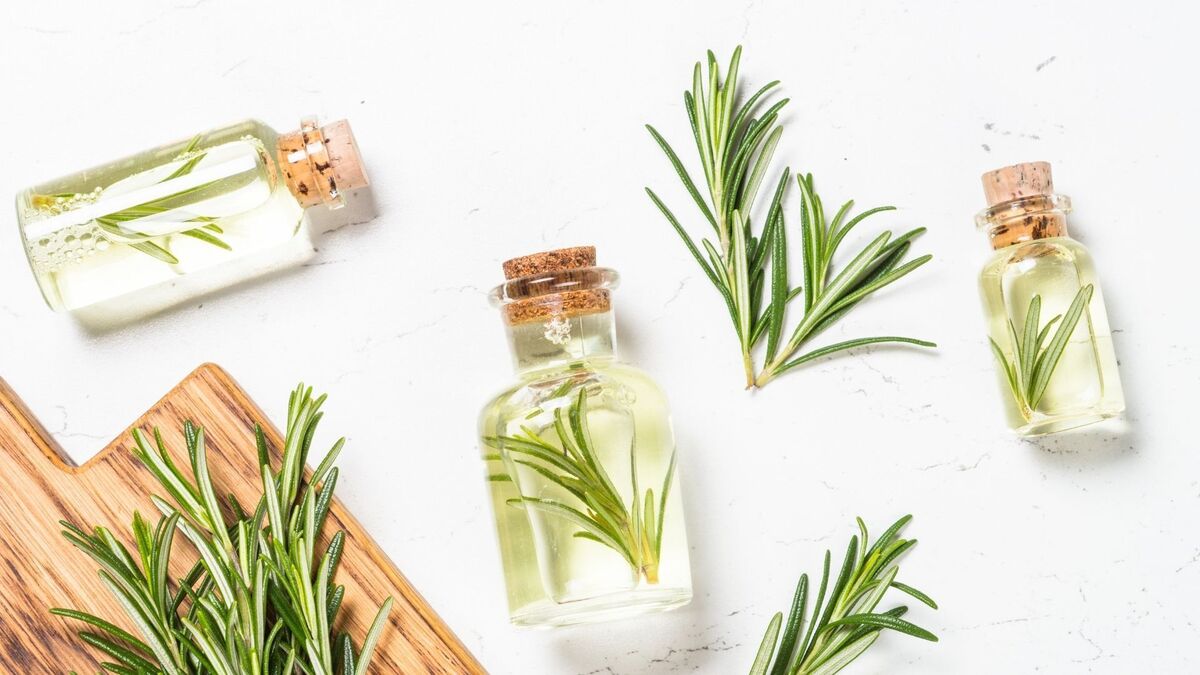
Rosemary oil has a penetrating and strong aroma. It brings a refreshing feeling. When inhaled, the oil serves to calm stress attacks and improve mood. See now, more information about rosemary oil and its care.
What is rosemary oil
Rosemary oil is made with the plant itself, mixed with a base oil of your choice and then it should be stored in a container for a long period.
This natural antibiotic has antimicrobial, antiseptic action and acts effectively in digestive problems. It also has diuretic, antioxidant and stimulant properties.
Rosemary oil should be diluted in water or in some base oil. This is because it is extracted in a very dense and concentrated form, being useful only in small quantities.
Therefore, you need to dilute it to increase its yield and make the most of its benefits.
How to make homemade rosemary oil
First of all, know that rosemary oil should be diluted in water because when pure, it can burn the skin. The branches should be dry for full effectiveness of the oil. You can cut the herb into small pieces.
Next, take a glass jar with a lid and add two cups of base oil which can be sweet almond, jojoba oil, grape seed or coconut.
Soon after, add 4 sprigs of rosemary, whole or chopped, close the glass well and let it rest in a warm, dark environment for 15 days.
After this time, strain it and place the mixture in another container and leave it closed for another 7 days. Then just use it, but in small quantities.
Contraindications to rosemary oil
Despite being extracted from a plant, rosemary oil has some contraindications. So much so that before use on babies, children, pregnant or breastfeeding women, it is necessary to consult a dermatologist.
In addition, the oil is contraindicated for hypertensive people, that is, people who suffer from the problem of high blood pressure.
Rosemary oil can increase blood pressure. It should be avoided by those with sensitive skin.
It can cause irritation, dermatitis and other skin problems and can cause burns. People who have stomach problems should avoid using the product.
Possible side effects
Just like the industrialized drugs, herbal and other herbal products can certainly have restrictions and even side effects for a certain group of people.
This is because there are reports that rosemary oil can increase the frequency of epileptic seizures in people who are already diagnosed with the disease. Your doctor will recommend the right dose to be consumed.
It will take into account the concentration of the oil. If consumed without first being diluted, it can cause headache, episodes of nausea, vomiting and skin irritation. Other adverse effects are stomach pains, intoxication and kidney problems.
What is rosemary oil used for
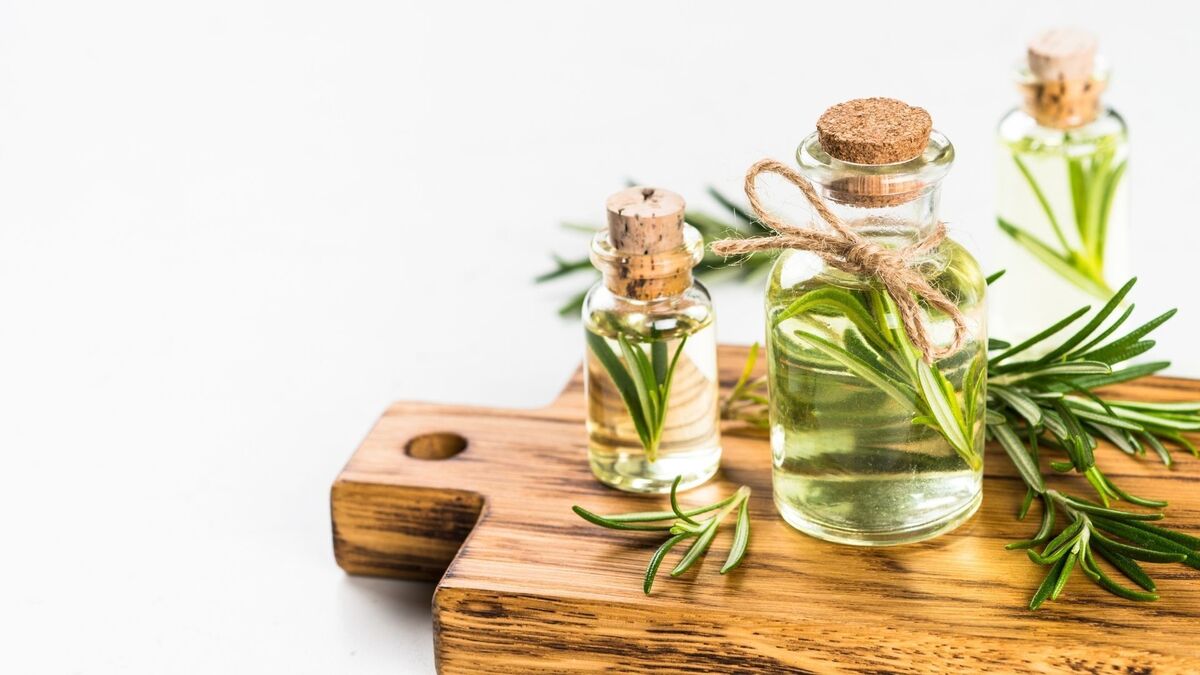
At first, rosemary oil is one of the most used ingredients in cosmetics for its benefits for skin, nails and hair.
It has anti-inflammatory, antioxidant, antimycotic and antimicrobial properties. In addition, it acts with anti-dandruff, analgesic, refreshing and mental stimulant action. Check here what rosemary oil is used for.
Relief from headaches
First of all, it is good to know that headaches can be caused by several factors, that is, external situations can generate this discomfort. Stress, hectic life, all this can influence.
Inhaling rosemary oil has many benefits and can also be used for headaches, however, pairing this with a facial massage with the oil will bring more results.
Take 2 or 3 drops of the rosemary oil and rub it on the palm of your hands, smell the aroma and then massage your face with circular motions on the temples.
Indigestion relief
Rosemary oil is good for stomach pain, constipation, flatulence, constipation, diarrhea or to stop unwanted indigestion.
The use of the product should be done externally, that is, through massages with the oil in the affected area.
Another way to use the oil is in a bath in the tub, adding a few drops in the water and during the bath, do massages.
Besides solving stomach problems, rosemary oil is very efficient in the treatment of liver diseases, improving the functioning of the liver, especially after the consumption of fatty foods and alcoholic beverages.
Caries prevention
Rosemary oil has antibacterial and antiseptic action, which helps prevent various oral problems, such as cavities.
It is indicated to add 20 drops of rosemary oil in a cup of warm water and do daily mouth rinses.
This product has a high preventive power since it combats various infections arising from opportunistic bacteria and should be used in order to sanitize the mouth.
But even with so many benefits, you need to consult your dentist before using rosemary oil to avoid possible adverse reactions.
Fights infections
Considered a natural antibiotic, rosemary oil is a shield that effectively fights various viruses that can attack the immune system, causing various infections in the body, such as herpes.
Rosemary oil, besides preventing and fighting the disease, certainly decreases the rate of transmission of this virus to other people.
In this case, you need to add a few drops of rosemary oil in a cup of boiling water and then inhale the steam.
It is also possible to apply the mixture directly to the affected site. Simply wet a clean gauze or cotton wool in the infected area.
Facial rejuvenation
Now we come to a very interesting aspect of rosemary oil. It works as a revitalizer and rejuvenator of the skin. This is because this substance can fight free radicals that attack the immune system of the body.
By reducing the concentration of these free radicals, rosemary oil is able to reduce premature aging of the skin, stimulating collagen production and softening expression wrinkles on the face.
First, dilute a small amount of oil in water or along with another base oil of your choice.
Spread the mixture on the face with light and circular movements. Soon after, wipe with a clean cloth dampened with warm water. It is a simple and effective method, however, it is necessary to consult a dermatologist before performing this procedure.
Stimulation of hair growth
It is normal to fall hair for hair renewal, however, when it is too much, it is necessary to seek a professional to study the case.
But if your hair is brittle, opaque and taking time to grow, rosemary oil will certainly solve the problem. It has anti-fungal properties, which effectively fights the bacteria responsible for the appearance of dandruff.
A tip to properly use rosemary oil is to add a few drops of the oil in your shampoo or dilute with water or other carrier oil and apply directly to the scalp every 15 days.
First, put the oil on the hair, always massaging the scalp and then wash with shampoo and conditioner.
Treatment of small wounds, burns and acne
First of all, know that diseases come from viruses or bacteria and this occurs occasionally with bruises, cuts, wounds, burns and also with acnes.
Rosemary oil is the method indicated in these cases because it strengthens the immune system, besides making a good cleaning in the affected place by its antiseptic action.
Just apply a small amount of oil, already diluted in water or other base oil, on the affected spot. For those with sensitive skin, it is recommended to consult a dermatologist before performing this application.
Improved circulation
Circulatory problems are the ones that cause the most pain in both men and women. Varicose veins, cellulite, stretch marks and cramps and muscle pain are the most common diseases as well as the most annoying, we can say so.
Rosemary oil when massaged into the affected area, works as a stabilizer of the blood veins in the body, deflating and improving blood circulation considerably.
In addition to relieving muscle tension with the combination of oil and massage, the aroma of this mixture brings the feeling and tranquility and relief.
The tip is to dilute the rosemary oil with another natural oil and finally, do the massage for a few minutes every day.
Improvement of the respiratory tract
One of the wonderful benefits of rosemary oil is to greatly improve your breathing.
It is very effective in preventing and fighting rhinitis, sinusitis, bronchitis and other respiratory problems that consequently generate other reactions such as nasal coryza, headaches and etc.
Inhaling rosemary oil soothes and clears the throat, decongests the lungs, and provides relief from coughs, flu, and colds.
For use of the oil in this particular case, simply dilute in a cup of boiling water for inhalation. You can also massage rosemary oil on the chest for colds and flu.
Memory enhancement and brain stimulation
Rosemary oil acts as a natural stimulant for memory, reasoning and concentration. Its therapeutic properties, make the brain more active and coordinated.
This is because it works on the nervous system, giving more mental clarity. It stimulates alertness, increases cognitive performance and consequently, improves memory.
The oil can be used as a preventative for Alzheimer's disease, anxiety disorder and depression. Simply boil a cup of tea, add a few drops of the oil and deeply draw in the steam a few times during the day.
Cautions when consuming rosemary oil
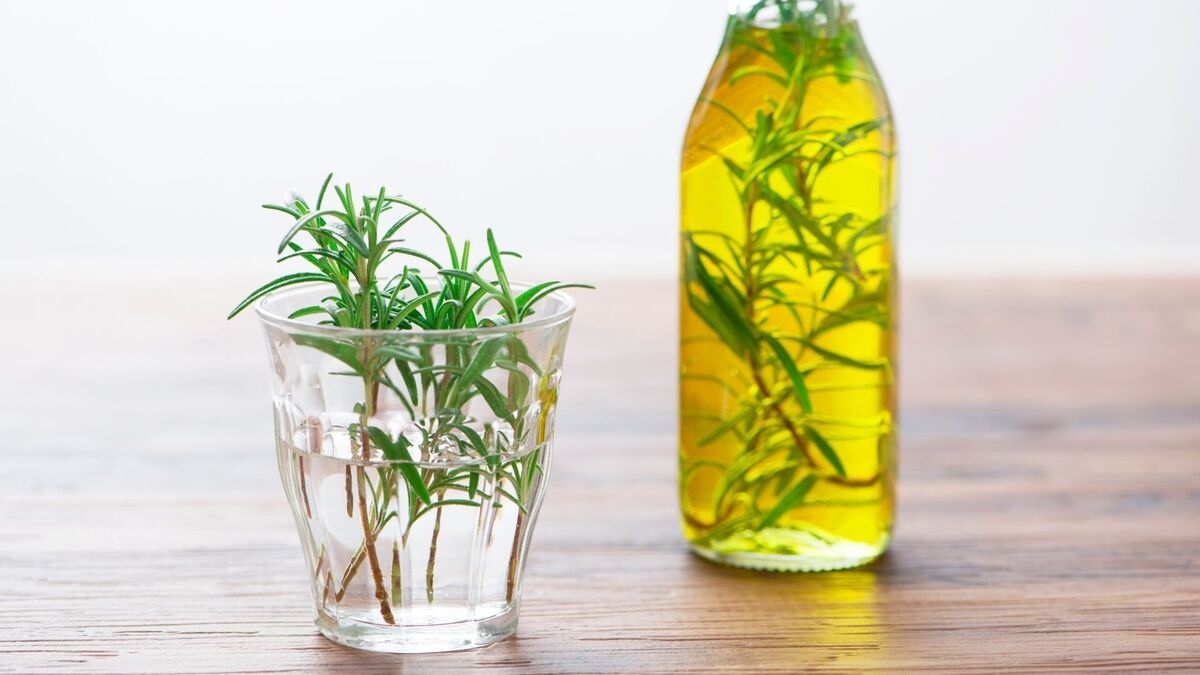
At first, rosemary oil is a natural substance, made of rosemary and essential oils.
However, the fact that it is natural, does not exempt this substance from being harmful to health, unless you seek guidance on how to use it safely. See now the care to consume rosemary oil correctly.
Abortive effect
The essential oils in its majority, possess more than 300 different substances in its composition, in other words, it is a very concentrated substance.
Rosemary oil is contraindicated for pregnant women because it can cause uterine contractions and in the worst case, induce a miscarriage and increased blood pressure.
Rosemary oil, like other essential oils, has emenagogic properties, meaning that it can cause bleeding, stimulating menstruation.
Pregnant women can under no circumstances use rosemary oil on the body or even inhale the substance.
Diuretic effect
Rosemary oil is known for its benefits on the digestive system and this includes a powerful diuretic effect as it slows down fluid retention, causing urine production to increase.
Consequently the body has great weight and fluid loss. This means that constant use of the oil can cause dehydration, drastically altering the body's production of lithium, reaching toxic levels.
Rosemary oil has many components that can accelerate beyond normal, the metabolism of the urinary system, making the continuous use of this product dangerous.
Allergic reaction
Because they are highly concentrated substances, essential oils, including rosemary oil, can cause contact dermatitis among other allergies, even for those without sensitive skin.
It can also cause excessive itching and cracks in the skin that can become infected and later become sores. For this reason, before using rosemary oil, consult your dermatologist.
The oils are extracted from leaves, roots, barks, flowers as well as seeds of plants, which contributes to the product being as concentrated as possible.
And due to many chemical elements, mixing rosemary oil with other base oils can also cause allergy instead of solving health problems.
How to use rosemary oil on hair and body
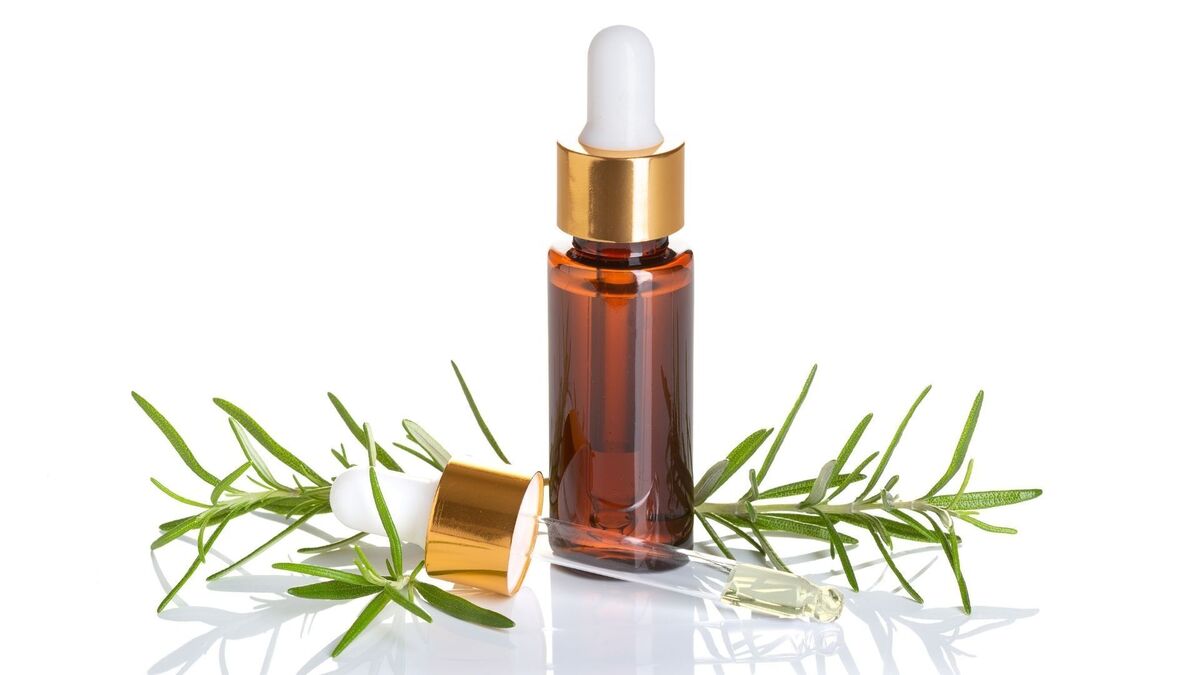
Rosemary oil is well known in the cosmetics industry as an excellent facial and body moisturizer.
It is also very effective in treating dandruff and other hair problems such as hair loss and weakening of the strands. Learn now how to use rosemary oil in hair and body.
Recipe for humectation
First of all, humectation is nothing more than moisturizing the hair with the use of vegetable or essential oils in order to nourish the strands more effectively and deeply.
To perform a safe rosemary oil moisturizing, dilute a few drops of the substance in a little water or coconut oil and apply on the hair from root to tip.
Let it act for about 1 or 2 hours and then wash normally with shampoo and in the sequence, apply the conditioner to close the hair cuticles.
Hair Tonic Recipe
First of all, know that rosemary oil besides fighting dandruff, also decreases and balances the oiliness of the scalp and also delays hair loss.
Hair tonic made on the basis of rosemary, can be made by infusing the leaves of the herb. First, separate a glass jar with a lid.
Secondly, boil some water, add it in the glass along with rosemary leaves and sprigs.
Close the glass and leave it to act for approximately 3 hours. When the water is dark, strain the liquid and leave it in the fridge. It is valid for 1 week.
Deodorant recipe
Rosemary is really a very versatile plant, being used for various purposes. And one of them is the rosemary deodorant that can be made at home.
At first, to prepare your homemade deodorant, you will need half a cup of water, four tablespoons of chopped rosemary, one and a half tablespoons of alcohol.
You will also need a tablespoon of witch hazel oil. Finally, add 5 drops of lemon juice.
First, boil the water along with the rosemary for about 10 minutes. Let it cool down and then mix the alcohol, the essential oil and the lemon juice. Do not expose to the sun because it can produce stains on the skin.
Soap with essence recipe
The rosemary soap is to unite the useful to the pleasant, is good for the skin and is also very easy to make. You will need 500 grams of glycerin, 300 ml of olive oil, 175 ml of coconut essential oil and 120 ml of boiling water.
You will also need 60 grams of caustic soda, a tablespoon of green clay, half a tablespoon of spirulina, a tablespoon of oat bran and 30 drops of rosemary essential oil.
Before anything else, use gloves and mask to prepare the soap. In a container add the glycerin, boiling water and coconut oil. Mix and then add the caustic soda little by little and the olive oil.
To finish, mix all the ingredients well and pour into a soap mold. Wait for it to cool and unmold.
Can rosemary oil also be used in home care?
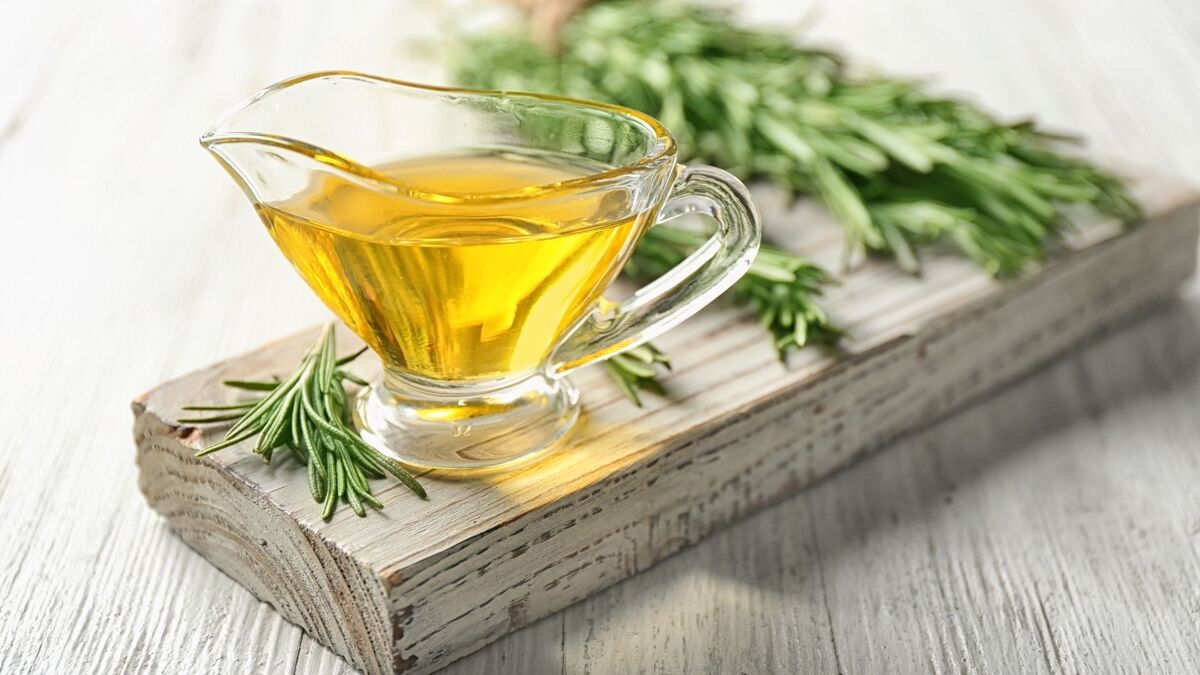
Rosemary oil can be used quietly in household care. This is because it works as an excellent insect repellent in general and also for cleaning surfaces.
Just mix the rosemary oil with a little mint oil, clove oil and apply in the environment with the use of a spray bottle. As for cleaning, the tip is to make a mixture with 12 drops of rosemary oil, white vinegar and water.

